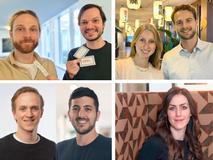Startups developing recyclable electronics, AI Agents for Hotels, the "Google Translate" for sign language, and an AI-powered virtual fitting room each receive CHF 10,000
24.03.2025
Circelec, Lobby, Sign.mt, and Vestir AI were selected in the first financial and entrepreneurial support stage of Venture Kick. Their projects use innovative additive manufacturing to print zinc onto eco-friendly substrates like paper, wood, or biopolymer producing cost-effective, RFID tags and low-complexity printed circuit boards; automate email-based reservation workflows, allowing hotels to manage requests in seconds; develop a unique translation approach that uses SignWriting as a linguistic bridge; and create an AI-powered virtual fitting room where shoppers can see clothes in 3D video form, based on their true likeness.
 |
 Circelec: CTO Nicolas Fumeaux & CEO James Bourely
|
 Lobby: CEO Romy Abbrederis and CPO Alex Mugrauer
|
 sign.mt: CEO Timothy Rabozzi & CTO Amit Moryossef
|
 Vestir AI: CEO Joanne Filbin
|
Circelec: Manufacturing recyclable electronics for the circular economy
More than 4 million tons of printed circuit boards (PCBs) will become electronic waste globally this year, with only 22% properly recycled. Current PCB production relies on harmful chemicals and non-biodegradable materials, contributing to severe environmental challenges. Circelec addresses this issue by creating recyclable circuit boards, fostering a sustainable circular economy.
Circelec is co-founded by EPFL alumni Dr. Nicolas Fumeaux (CTO) and Dr. James Bourely (CEO). With its patent-pending technology, Circelec uses innovative additive manufacturing to print zinc onto eco-friendly substrates like paper, wood, or biopolymer producing cost-effective, RFID tags and low-complexity PCBs. Initially targeting the $10B RFID market (11% CAGR), Circelec plans to expand to the USD 100B PCB industry.
The Venture Kick funds will contribute to validating the technology and ideally position Circelec for pilot projects with industrial partners.
Lobby: AI Agents for Hotels
Hotels face staffing shortages, shrinking profits, and growing guest expectations. Staff spend hours manually handling booking requests, cancellations, and RFPs—complex cases can take up to two hours, leading to lost revenue.
Lobby automates email-based reservation workflows, allowing hotels to manage requests in seconds. Unlike chatbots, it deeply integrates with reservation systems and handles complex cases using a Human-in-the-Loop (HITL) approach to ensure accuracy.
When a customer emails a hotel, Lobby analyzes, categorizes, and processes the request. Staff can review critical cases, while others are handled automatically. This reduces workload, prevents errors, and improves response time.
A member of the EHL Innovation Hub, Lobby is piloting with three Swiss hotels. Founders Romy, a software engineer who co-managed a 4-star hotel, and Alex, with a banking process automation background, previously worked together at Avaloq.
With Venture Kick’s support, Lobby will accelerate development, expand integrations, and scale adoption.
sign.mt: The "Google Translate" for sign language
Worldwide, 70 million deaf people deserve equal access to information and services but are often overlooked as users and customers. Written text is frequently inaccessible, while human interpreters are expensive and not scalable.
That’s why Amit, an award-winning NLP expert with a Ph.D. in AI sign language translation, and Timothy, a seasoned innovation leader, founded sign.mt. Their unique translation approach uses SignWriting as a linguistic bridge, decoupling vision from translation to improve accuracy, reduce data needs, and scale efficiently. The global market for sign language translation is estimated at 30 billion dollars and is expected to grow further with increasing legal requirements for accessibility.
The team will use Venture Kick Stage 1 funds to improve their live demo and deliver value to customers and users. They will also invest in educational materials to raise awareness and deepen understanding of the accessibility challenges.
Vestir AI: Recreating the in-store fitting room experience, online
Most people don’t look like fashion models on retailer websites, but this is who we base our buying decisions on. This means we make the wrong choices and have to send things back. 30% of all clothes bought online are returned. It costs the EU fashion industry EUR 36bn annually and releases 750k tons of CO2 into the atmosphere in the UK alone.
Vestir is an AI-powered virtual fitting room where shoppers can see clothes in 3D video form, based on their true likeness. As their avatar moves, the fabric moves. They see their own body, face & skin tone, with their natural movement.
Founded by Joanne Filbin, an experienced entrepreneur. Vestir is partnering with the ETH AI Center on an 18-month project to perfect the science, funded through an Innosuisse Implementation Partner project.
The Venture Kick funds will be used to forge pan-European Retailer partnerships to build a solution that is truly fit for purpose.
More than 4 million tons of printed circuit boards (PCBs) will become electronic waste globally this year, with only 22% properly recycled. Current PCB production relies on harmful chemicals and non-biodegradable materials, contributing to severe environmental challenges. Circelec addresses this issue by creating recyclable circuit boards, fostering a sustainable circular economy.
Circelec is co-founded by EPFL alumni Dr. Nicolas Fumeaux (CTO) and Dr. James Bourely (CEO). With its patent-pending technology, Circelec uses innovative additive manufacturing to print zinc onto eco-friendly substrates like paper, wood, or biopolymer producing cost-effective, RFID tags and low-complexity PCBs. Initially targeting the $10B RFID market (11% CAGR), Circelec plans to expand to the USD 100B PCB industry.
The Venture Kick funds will contribute to validating the technology and ideally position Circelec for pilot projects with industrial partners.
Lobby: AI Agents for Hotels
Hotels face staffing shortages, shrinking profits, and growing guest expectations. Staff spend hours manually handling booking requests, cancellations, and RFPs—complex cases can take up to two hours, leading to lost revenue.
Lobby automates email-based reservation workflows, allowing hotels to manage requests in seconds. Unlike chatbots, it deeply integrates with reservation systems and handles complex cases using a Human-in-the-Loop (HITL) approach to ensure accuracy.
When a customer emails a hotel, Lobby analyzes, categorizes, and processes the request. Staff can review critical cases, while others are handled automatically. This reduces workload, prevents errors, and improves response time.
A member of the EHL Innovation Hub, Lobby is piloting with three Swiss hotels. Founders Romy, a software engineer who co-managed a 4-star hotel, and Alex, with a banking process automation background, previously worked together at Avaloq.
With Venture Kick’s support, Lobby will accelerate development, expand integrations, and scale adoption.
sign.mt: The "Google Translate" for sign language
Worldwide, 70 million deaf people deserve equal access to information and services but are often overlooked as users and customers. Written text is frequently inaccessible, while human interpreters are expensive and not scalable.
That’s why Amit, an award-winning NLP expert with a Ph.D. in AI sign language translation, and Timothy, a seasoned innovation leader, founded sign.mt. Their unique translation approach uses SignWriting as a linguistic bridge, decoupling vision from translation to improve accuracy, reduce data needs, and scale efficiently. The global market for sign language translation is estimated at 30 billion dollars and is expected to grow further with increasing legal requirements for accessibility.
The team will use Venture Kick Stage 1 funds to improve their live demo and deliver value to customers and users. They will also invest in educational materials to raise awareness and deepen understanding of the accessibility challenges.
Vestir AI: Recreating the in-store fitting room experience, online
Most people don’t look like fashion models on retailer websites, but this is who we base our buying decisions on. This means we make the wrong choices and have to send things back. 30% of all clothes bought online are returned. It costs the EU fashion industry EUR 36bn annually and releases 750k tons of CO2 into the atmosphere in the UK alone.
Vestir is an AI-powered virtual fitting room where shoppers can see clothes in 3D video form, based on their true likeness. As their avatar moves, the fabric moves. They see their own body, face & skin tone, with their natural movement.
Founded by Joanne Filbin, an experienced entrepreneur. Vestir is partnering with the ETH AI Center on an 18-month project to perfect the science, funded through an Innosuisse Implementation Partner project.
The Venture Kick funds will be used to forge pan-European Retailer partnerships to build a solution that is truly fit for purpose.


